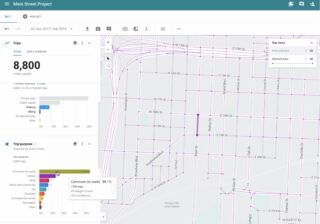
A data project billed as the “next generation urban planning tool” that involved over two years of negotiations between Metro, TriMet, the City of Portland, and Google-owner Alphabet has crashed-and-burned.
On Saturday, Red Tail Media reported that a contract between Metro and Sidewalk Labs to develop the Replica tool for regional use been officially terminated. “A city tech project in Portland with the Sidewalk Labs spin-off leads to accusations, data disputes and ‘damaged trust'” reads the headline, which was then picked up by the BBC on Tuesday.
Quick background:
In December 2018, Portland City Council adopted an intergovernmental agreement to embark on the ambitious, 12-month project with a budget of $457,300. “This tool can fundamentally change the game for us,” a PBOT staffer said at the council hearing. Former Portland Bureau of Transportation Commissioner Chloe Eudaly was “very excited” about it: “The more information we have about how, when, and why our streets being used, the better we are able to plan for and accommodate those demands and make our city work better for everyone.”
Advertisement
The project was specifically intended to improve counting of bike riders, walkers, and micromobility users. The lack of data for these modes (compared the precise numbers we have for transit and car users) puts them at a severe disadvantage for government funding.
Here’s a snip from Red Tail Media reporter Kate Kaye:
A couple things really got [Metro Senior Technology Strategist Eliot] Rose and the Metro crew excited about Replica. One was the ability to gauge movement patterns of people on bikes, scooters or on-foot rather than more-readily tracked cars and public transportation. The other: the promise of predicting how traffic or public transportation decisions might affect the BIPOC community or other vulnerable residents….
But by August 2020, Metro decided Replica had failed to meet its acceptance criteria. So, Replica proposed to alter that criteria. But Metro didn’t like the idea much.
“Based on what you’re proposing, we don’t feel like we can rely on Replica as a source of bike/ped [pedestrian] data, as an input to our travel model, or as a tool for detailed equity analyses – all of which are central to our use cases and to the reasons why we chose to pursue this partnership in the first place,” Rose told Ahern, the Replica customer rep.
Essentially, said Ahern, Replica didn’t get enough of that data from Metro. “While Portland is unfortunately not unique in its limited ground-truth for bike and pedestrian data, it’s worth noting that we were only supplied with seven (7) bike sensors and pedestrian counts that only included 2 hours worth of counts per location/day,” wrote Ahern at the time to Rose and other Metro staff, cc’ing Bowden.
Read more of Kaye’s excellent and in-depth reporting here.
This is an unfortunate turn of events and it’s not yet fully clear how this impacts Metro’s planning work. Being able to analyze bike/walk/scooter traffic is absolutely imperative to making funding and planning decisions and without these numbers we’ll continue to be in the dark and our models won’t allow these modes to compete with cars and transit.
I’ll follow up with Metro and report back. Stay tuned.
— Jonathan Maus: (503) 706-8804, @jonathan_maus on Twitter and jonathan@bikeportland.org
— Get our headlines delivered to your inbox.
— Support this independent community media outlet with a one-time contribution or monthly subscription.


